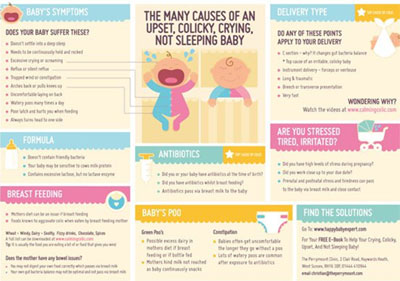How Maternal Prenatal Stress Could Shape an Infant’s Gut Health
This is a big study for me! And for you as a new mum with a colic baby. It gives yet another scientific reason why your baby has colic, wind pain, CMPA, reflux or tummy issues. All these can be triggered by an imbalance in your baby’s good and bad bacteria in their bowels. The study shows that it can happen if your delivery was stressful!
Did you have a stressful delivery?
If you did, fear not we have a way to help your baby! Read on…
Pregnancy can be a challenging period for many mothers, with the accompanying emotional and physical changes. Recent research has further illuminated the profound impact that a mother’s stress during pregnancy might have on her infant’s health, especially their gut health.
The Puzzling Link Between Maternal Stress and Infant Health
Previous studies have consistently highlighted the connection between maternal prenatal stress and various health issues in infants, ranging from physical ailments like premature birth to psychological challenges like ADHD. The exact mechanisms behind these links remained largely mysterious until recently.
New Findings: The Role of Gut Microbiota
A recent study by Zijlmans et al. has delved deeper into this connection, revealing fascinating insights:
– The team investigated the gut health of 56 healthy Dutch infants for the first 110 days after birth.
– Their findings were revealing. Infants born to mothers who reported higher stress levels or showed elevated cortisol (a stress hormone) concentrations during pregnancy had a notably different gut microbiota composition.
– More specifically, these infants had a higher presence of bacteria groups associated with disease and a lower presence of beneficial bacteria essential for gut health and immunity.
Why Does This Matter?
These shifts in the gut microbiota could potentially lead to increased gastrointestinal symptoms and allergic reactions in the infants, such as colic or cows milk protein allergy and reflux. This means that the mother’s stress level during pregnancy might indirectly predispose her child to health challenges.
Addressing the Issue
While this study presents a groundbreaking connection, it’s essential to understand that causality hasn’t been firmly established. However, if these findings hold in larger populations and further studies, it could open doors to innovative preventive measures. For instance, bacterial interventions during pregnancy might be a way forward to ensure optimal health and development for the infant.
If you watch and read more of my information on this website you will know that we have a very effective way of correcting this gut imbalance by using probiotics. Read more here:
The probiotics I recommend can be purchased here:
In Conclusion
Motherhood is often described as a journey, and like all journeys, it comes with its ups and downs. It’s imperative for soon-to-be and new mothers to seek support, both emotionally and physically. As the research suggests, a happy and stress-free mother could very well be the key to a healthier and happier baby. I hope that the information on this page and in my ebook and course will help you with your baby!
My baby help ecourse is here: Calming Colic Online Solution
*For further insights and information on the study, visit [DOI link](https://doi.org/10.1016/j.psyneuen.2015.01.006).*
Summary of this study
– **Study Objective**:
Investigate the relationship between maternal prenatal stress and the development of infant intestinal microbiota over the first 110 days after birth.
– **Background**:
– Maternal prenatal stress previously linked to infant health and psychological functioning.
– Existing studies suggest stress during pregnancy can lead to premature birth, low birth weight, eczema, asthma, and more.
– Recent research hints at the infant gut microbiota playing a role in these links.
– **Methods**:
– Longitudinal study with 56 healthy, vaginally born Dutch infants.
– Monitored infant intestinal microbiota development over 110 days.
– Measured maternal reported stress and salivary cortisol concentrations.
– **Key Findings**:
– Maternal prenatal stress consistently correlated with changes in infants’ microbiota composition.
– Infants exposed to high maternal stress during pregnancy had:
– Higher relative abundances of potential pathogens (e.g., Escherichia, Serratia).
– Lower relative abundances of beneficial bacteria (e.g., Lactobacillus, Bifidobacteria).
– Altered microbiota composition was linked to increased infant gastrointestinal symptoms and allergic reactions.
– **Conclusion**:
Maternal prenatal stress might influence infant intestinal microbiota, which could subsequently affect the infant’s health.
**SEO Optimization**:
– **Primary Keyword**: Maternal prenatal stress
– **Secondary Keywords**: Infant health, gut microbiota, pregnancy, cortisol, bacterial interventions.
– **Meta Description**: Explore how maternal prenatal stress may influence an infant’s gut health and overall well-being, based on recent research by Zijlmans et al.
– **Image Alt Texts**: Maternal stress during pregnancy, Infant gut health research, Link between stress and infant health.
(Note: Ensure that the content is evenly interspersed with the primary and secondary keywords for better SEO results. Also, link-building with related reputable sites and including share buttons for social media can enhance the blog’s visibility.)



No Comments